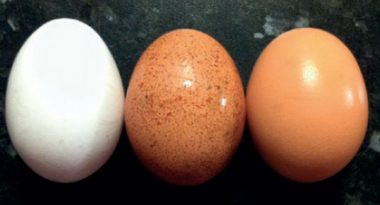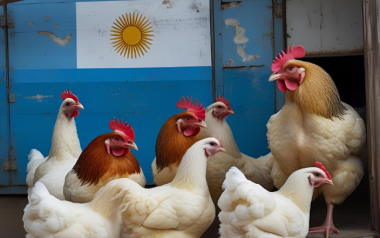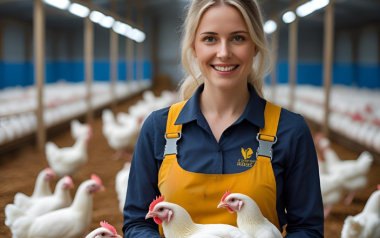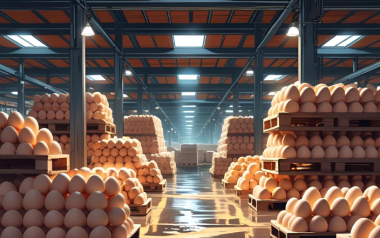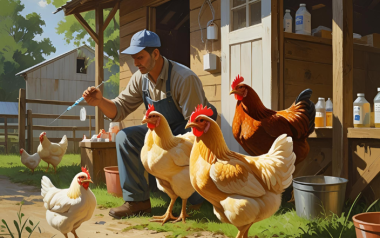Even if you’ve cracked billions of eggs in your life, every now and then, odd things can be noticed in the shells. If you’ve ever noticed a brown or red spots in your eggs, then you know exactly what we’re talking about. But there’s no need to panic! It’s probably fine and totally edible.
29 May 2020
Understanding blood and meat spots: Are they safe?
Even if you’ve cracked billions of eggs in your life, every now and then, odd things can be noticed in […]
Available in other languages:
Just for reassurance, we’ve discussed these observations with a professor emeritus of poultry science and a farmer to have their expert opinions. They explained the mysteries of what exactly is in your egg.
Blood spots
They’re tiny red blood spots on the yolk, and if you thought you got a fertilized egg, well, you’d be wrong.
“Blood spots are caused by a tiny tear when the egg yolk releases from a chicken’s ovary,” Michael Darre, professor emeritus of poultry science at the University of Connecticut.
The chances of actually encountering one is quite low, thanks to improved candling methods, a process that beams a bright light source through shell, sort of like an X-ray for eggs. “With highly efficient candling machines, which can process 450 cases of eggs an hour, defects like blood spots rarely get through these days,” Darre said.
Are they safe to eat? The consensus is yes, but feel free to scrape them away with the tip of a knife before you cook them.
Meat spots
If you’ve picked up farm-fresh eggs from a local producer, it’s possible you have noticed a brownish or reddish spot floating in the egg. This is a small tissue torn from the chicken as the egg moved through her reproductive system.
“It’s considered a ‘flaw’ of the bird, but to say that would be a little unfair, since it was going through her reproductive system,” Lucie Amundsen, co-owner and “marketing chick” at Locally Laid Egg Company and author of a memoir on the egg business, adding that “They’re fairly rare.”
Like blood spots, they’re also safe to eat, but you can discard them by gently scraping the tip of your knife.
Double yolks
Congrats, you just won nature’s protein lottery! A double yolker is a pretty rare occurrence, not only because of modern candling methods we mentioned earlier, but because they’re typically only produced by chickens in a couple of specific age groups. “You’ll find more double yolks from young pullets or much older hens,” Darre said.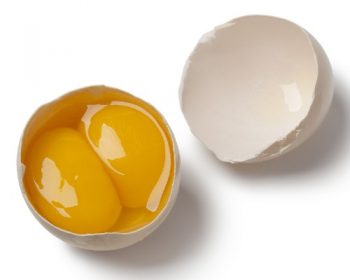
Selecting jumbo eggs would be in your favour in hitting this nature’s jackpot, which tends to come from these two chicken age demographics.
Dark yolk color
This is actually a positive sign! According to the Egg Nutrition Center, yolk color is dependent on how much carotenoid content is in a hen’s diet. Amundsen says that her own experience at Locally Laid confirms that. “In the summer, when our chickens are eating clover in the pasture and lots of juicy bugs, their yolks tend to get very bright,” she said.
Research has shown that darker-yolked, pasture-raised eggs are packing more nutritional values than their conventionally produced counterparts, with less cholesterol and more omega‑3s and beta carotenes.
Shell weirdness
Shell color is highly dependent on the breed of hen, and has no impact on its nutritional value. Eggshells can occasionally vary in shape and texture. You probably never see these odd-shaped eggs, Darre said, because they get sent to what’s called “breakers,”which process them into different types of products.
Backyard chickens or farmer’s markets are the places you might see the occasional odd shapes the most, but they pose no harm. Additionally, if you notice a sandpaper-type texture to your eggs, those are just calcium deposits that weren’t smoothed away during the laying process and are also harmless to eat.
